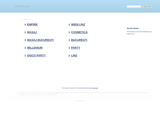
This is a two-sided resource for students to use when responding to reading.
- Subject:
- English Language Arts
- Material Type:
- Formative Assessment
- Learning Task
- Reference Material
- Provider:
- unknown
- Date Added:
- 04/05/2017

This is a two-sided resource for students to use when responding to reading.

In this 8 eight-week module, students explore the experiences of people of Southern Sudan during and after the Second Sudanese Civil War. They build proficiency in using textual evidence to support ideas in their writing, both in shorter responses and in an extended essay. In Unit 1, students begin the novel A Long Walk to Water (720L) by Linda Sue Park. Students will read closely to practice citing evidence and drawing inferences from this compelling text as they begin to analyze and contrast the points of view of the two central characters, Salva and Nya. They also will read informational text to gather evidence on the perspectives of the Dinka and Nuer tribes of Southern Sudan. In Unit 2, students will read the remainder of the novel, focusing on the commonalities between Salva and Nya in relation to the novel’s theme: how individuals survive in challenging environments. (The main characters’ journeys are fraught with challenges imposed by the environment, including the lack of safe drinking water, threats posed by animals, and the constant scarcity of food. They are also challenged by political and social environments.). As in Unit 1, students will read this literature closely alongside complex informational texts (focusing on background on Sudan and factual accounts of the experiences of refugees from the Second Sudanese Civil War). Unit 2 culminates with a literary analysis essay about the theme of survival. Unit 3 brings students back to a deep exploration of character and point of view: students will combine their research about Sudan with specific quotes from A Long Walk to Water as they craft a two-voice poem, comparing and contrasting the points of view of the two main characters, Salva and Nya,. The two-voice poem gives students an opportunity to use both their analysis of the characters and theme in the novel and their research about the experiences of the people of Southern Sudan during the Second Sudanese Civil War.
Find the rest of the EngageNY ELA resources at https://archive.org/details/engageny-ela-archive .
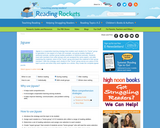
Jigsaw is a reading comprehension strategy encouraging cooperative learning among students.
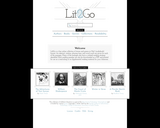
Lit2Go is a free online collection of stories and poems in Mp3 (audiobook) format. An abstract, citation, playing time, and word count are given for each of the passages. Many of the passages also have a related reading strategy identified. Each reading passage can also be downloaded as a PDF and printed for use as a read-along or as supplemental reading material for your classroom.
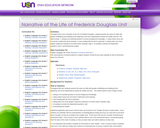
Throughout this unit on Narrative of the Life of Frederick Douglass, students practice the same six skills with greater scaffolding and modeling at the beginning, and more independence toward the middle and end. The tasks include: 1. writing to an essential question to access background knowledge; 2. using context clues and root words to determine word meaning; 3. close reading with the aid of a glossary; 4. taking notes one of two graphic organizers (sequence of events and/or empathy map); 5. re-reading to answer text dependent questions; and 6. summarizing the chapter.
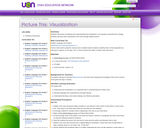
In this lesson students will practice visualizing and understanding that visualization is an important comprehension strategy. Students will share their visualization of the story through original artwork.
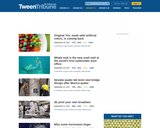
Smithsonian TweenTribune allows you to easily create a classroom and assign dailly AP news articles that are Lexile® leveled for K-12 students. It also includes: self-scoring quizzes customized by Lexile® level, critical thinking questions, student commenting, Espanol AP articles, weekly lesson plans and videos and weekend "Monday Morning Ready" newsletter as prep for the week ahead.
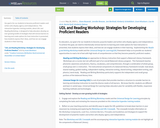
Our goal is for our students to become proficient readers and writers who display agency and independence. This interactive hyperdoc training module, about UDL and Reading Workshop, is designed to help educators develop an ever-growing toolkit of strategies that will remove barriers to learning and create options for how instruction is presented, how students express their ideas, and how we can engage students in their learning.
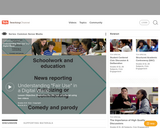
Students explore the concept of fair use, apply it to case studies, and
create an original work of fair use.
Students learn how to judge whether something is protected by fair use
by using the Four Points of Fair Use Student Handout. They
apply the four points of fair use to two case studies, a remixed video and
a mash-up song, to judge whether or not they fall under fair use.
Students then create an original work of fair use by reworking
copyrighted material to create a collage or a remix video.
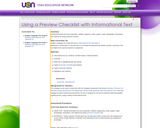
In this lessons students identify information from text using titles, subtitles, diagrams, charts, graphs, maps, photographs, illustrations, and captions by using a preview checklist.